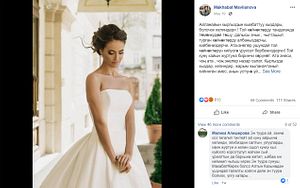Last week in Kyrgyzstan, a social media scandal played out between a parliamentarian and a city hall bureaucrat and again exposed the contours of the country’s culture wars.
On May 19, parliamentarian Makhabat Mavlianova posted a photo of a woman in a sleeveless wedding dress on her personal Facebook page. The photo included a caption warning young women against getting married in such revealing dresses, which could draw undesirable attention from wedding guests and future in-laws.
For Mavlianova, wedding attire reveals more than sartorial trends and represents improper consideration of Kyrgyz customs. “European democracy, in terms of behavior and choice of clothes, doesn’t suit us,” Mavlianova wrote. “Let’s raise our children and instill in them true Kyrgyz values!”
Dozens of people commented and shared Mavlianova’s post, which quickly got picked up by local media.
Gulya Almambetova, who works for Bishkek city hall as a public relations specialist, was upset by what she saw as the government encroaching on the freedom of choice and responded to one such article with a concise call for Mavlianova to “f*** off.”
Almambetova says she didn’t expect anyone to notice when she cursed out Mavlianova on Twitter, but her explicit response attracted national media attention. This in turn sparked a debate about how public officials should conduct themselves online.
As Almambetova sees it, the fact that she and Mavlianova are both women played a large role in making this episode so contentious. “Many people called and wrote to say they supported me,” Almambetova told The Diplomat. She said that most of the people who reached out to express support privately were men who agreed with her position, but thought it was “a man’s job” to call out deputies. She thinks people find it unsettling that a woman “said what everyone is thinking but is afraid to say out loud.”
This scandal underscores tension in the relationship between the government and the masses in Kyrgyzstan, but it also reveals a misalignment of priorities among government officials.
While Almambetova values the symbolic freedom of getting to wear whatever type of wedding dress one fancies, she is more worried about public officials’ emphasis on the protection of Kyrgyz values over the protection of Kyrgyz women from gender-based violence. “Better to figure out how to protect children from domestic violence and how to protect girls from forced marriage!” Almambetova said over private message. “I don’t want women to be kidnapped. I don’t want women to be humiliated or insulted.”
Coincidentally, the confrontation between Mavlianova and Almambetova has played out over the anniversary of Burulai Turdaaly kyzy’s death. On May 27, 2018, the 20-year old medical student was murdered in a police station where she had come to file a report against her abductor and seek protection. Her death sparked national outrage, with protesters across the country demanding stricter punishment for “bride kidnapping,” a so-called traditional practice known as ala kachuu in Kyrgyz. A 2018 UNICEF report found that almost 14 percent of women under 24 married through some form of coercion, despite ala kachuu being illegal under the Kyrgyz criminal code.
Perhaps it is unfair to press Mavlianova in particular on women’s rights. It should not be the sole responsibility of women in positions of power to tackle and dismantle oppressive structures. Even so, this obsession with women and their appearance remains a question of life and death for many. While the life cycle of a social media scandal may be brief (the clamor over Almambetova’s profanity-laden response to Mavlianova seems to have already passed), hopefully bigger questions raised about freedom of choice and gender equality do not fall to the wayside.

































